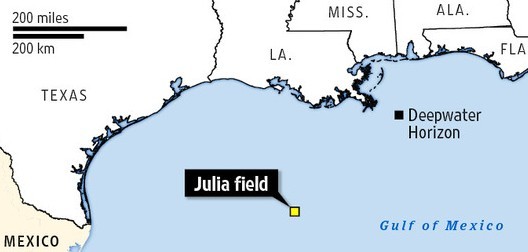
Federal officials have settled a dispute with Exxon Mobil Corp. (XOM) and Statoil ASA (STO, STL.OS) over one of the largest?offshore oil?discoveries ever made in the Gulf of Mexico that arose because the companies had failed to come up with a plan to begin producing oil.
Under terms of the settlement, filed Friday, Exxon Mobil and Statoil will get to keep their leases in the Julia deep-water field?which Exxon estimates could hold one billion barrels of recoverable oil.
Exxon and Statoil also agreed to several concessions, including a promise to have installed an offshore platform and begin producing oil by June 2016. The companies also agreed to pay a significantly higher rental rate for the acreage, about $11.2 million a year, until the field has produced 87.5 million barrels. At that point a royalty rate of 18.75% will kick in. The lease had been granted with no royalty rate.
(This story and related background material will be available on The Wall Street Journal website, WSJ.com.)
?The settlement will allow Exxon Mobil to develop this very large, but technically challenging, resource as quickly as possible using a phased approach,? said company spokesman Patrick McGinn in a statement.
If the lease had expired, Exxon would have faced the prospect it would revert back to the government, essentially losing a multibillion-dollar asset.
The stakes in the case were also high for the government, which didn?t want to be seen as bending its own rules even as it attempts to strengthen its offshore rules in the wake of the Deepwater Horizon?oil spill.
An Interior Department spokeswoman said the agreement ?provides incentives for timely and thorough development of the leases, and secures a fair return on those resources to the U.S. Treasury.?
While the government extracted several concessions from Exxon, the Texas oil giant dodged a major embarrassment and loss of future revenue. Exxon was facing the prospect of having made one of the largest oil finds ever in its century-long history, only to lose it because it failed to follow federal rules for getting a lease extension.
The dispute over the Julia field began in October 2008?about a month before Exxon?s 10-year lease expired. It applied for a five-year extension, but was denied because it had not met the requirement to commit to a specific development plan. Exxon, and its partner Statoil, sued in federal court to prevent the government from taking back the lease.
- (c) Dow Jones & Company, Inc.
No related posts.
Source: http://feedproxy.google.com/~r/Gcaptain/~3/YeRNAJgBnro/
ryan seacrest the secret life of bees sat cheating scandal kyle orton kyle orton pope joan pope joan
No comments:
Post a Comment
Note: Only a member of this blog may post a comment.